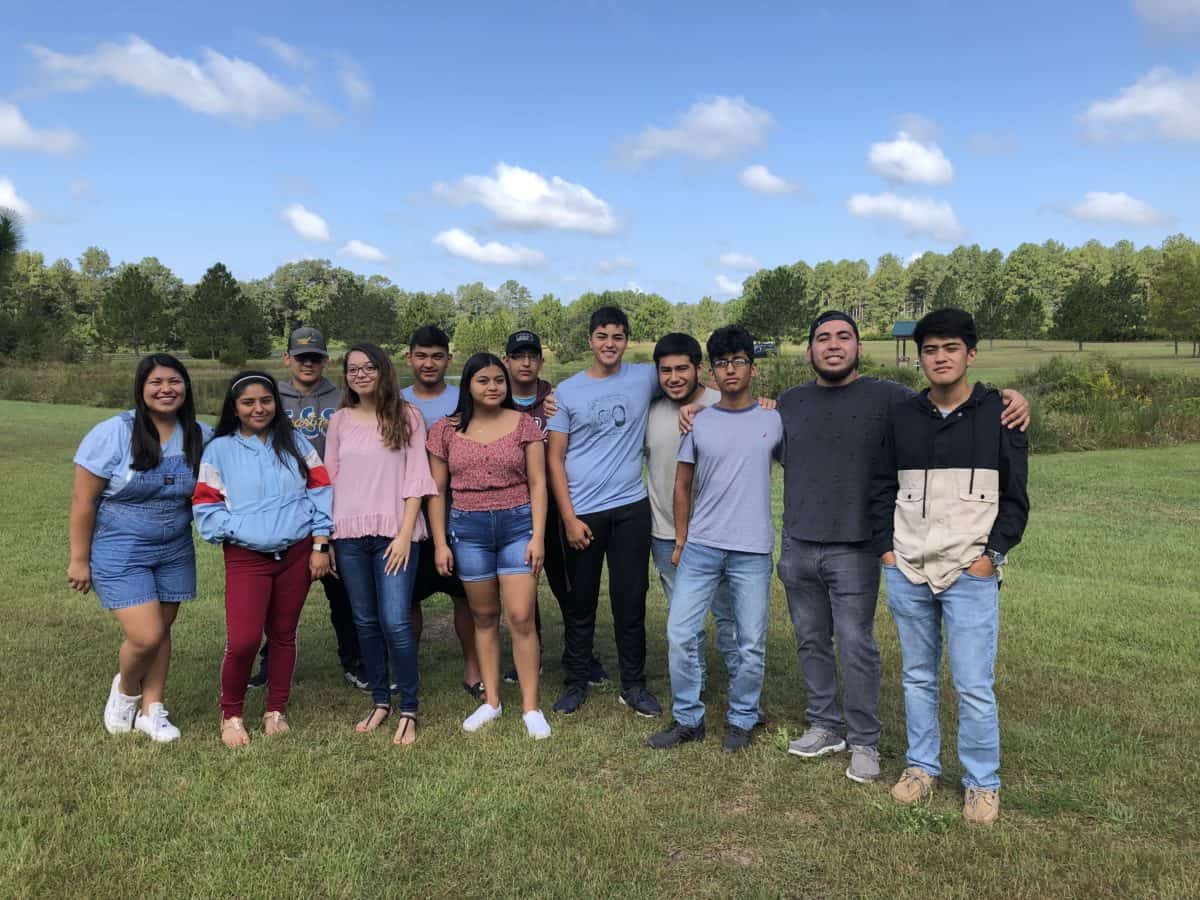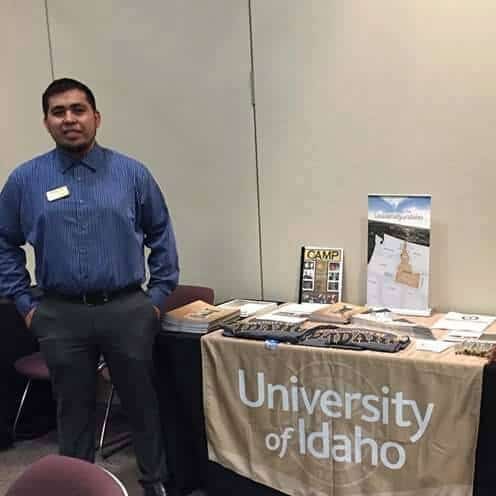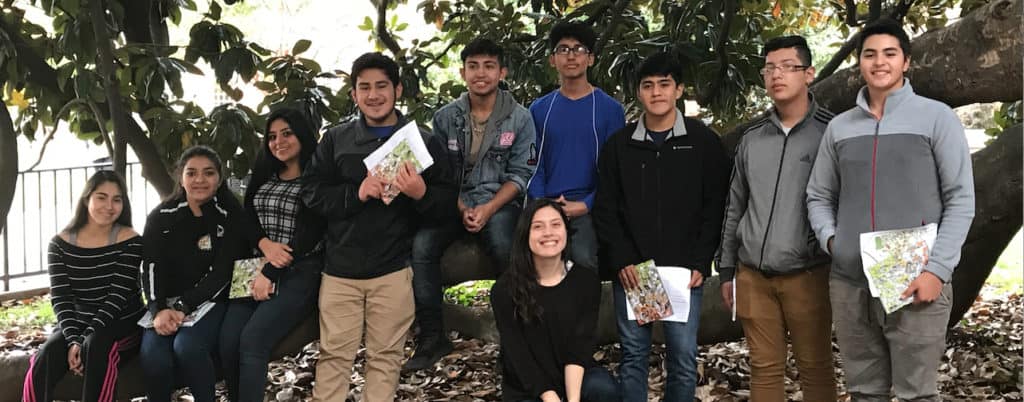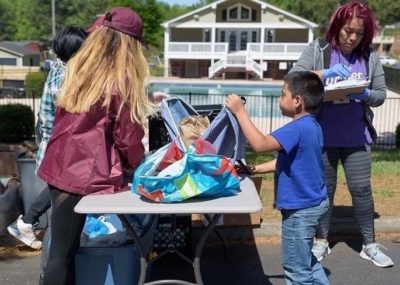
This article is part of a series and ongoing reporting on Latinx communities in North Carolina. Click here to read more.
Victor Canales Gamiño works to break down educational barriers facing migrant farmworkers in rural North Carolina, much the same as others did for him growing up in rural Idaho. In high school, Gamiño dreamt of going to college, but it seemed like those aspirations were for other students — students who weren’t the children of migrant farmworkers. No one in his family knew about the application process or how to submit for financial aid. Even when he met with his college counselor about the idea, the counselor expressed surprise at his academic ambitions.
“I don’t know if I’m fitting a profile or a stereotype in their head, but all those factors [told me] I’m not going to go to college. I was going to work at a dairy or in the fields,” says Gamiño.
It all changed for him when a recruiter from the state’s flagship research university visited Gamiño’s high school. He had to miss work to attend the after-school presentation about University of Idaho, but it would set him on an entirely new trajectory.

“He talked about him working in the fields, then going to college. About his parents thinking it was too far. And I was like, that’s my story.” Gamiño’s eyes still light up when relaying the story. For the first time, he thought a university campus could be a place for someone like him.
The recruiter turned out to provide much more than a glossy sales pitch. He kept in touch with Gamiño and, perhaps most consequentially, took the time to engage his family and answer their questions.
“He supported me in every step of the way, helped me apply. I remember that he would just call me, be like, ‘Hey, I need you to fax me these papers.’ So I remember telling my mom I will need money to send it. So that we would be looking for quarters, you know, to try to fax stuff to him,” Gamiño said with a smile.
A growing challenge
More than 500,000 people under the age of 18 are farmworkers, and they are overwhelmingly (77%) Latinx.1 Financial realities prompt many families to move around the country throughout the year to support seasonal agriculture needs year-round. The Office of Migrant Education at the U.S. Department of Education estimates that roughly half of migrant students drop out of school in the face of cultural differences, language barriers, and persistent poverty.2 One expert in Arizona called them “the most educationally disadvantaged in the country.”
Roughly 150,000 farmworkers pick North Carolina’s blueberries, sweet potatoes, cucumbers, and watermelons. As the state’s Latinx population has boomed, rural counties are feeling a disproportionate demographic shift. The federal government provides resources to states’ Migrant Education Programs (MEP). North Carolina’s MEP serves 4,000 to 6,000 annually, which is likely only a portion of the full population, in an assortment of 29 targeted counties. MEP is designed to recruit students into the classroom and support their persistence through graduation.
Demonstrating the difficulties of the task, a recent NC MEP program report found that roughly a third of those students drop out in high school, most often between 9th and 10th grade. Of them, 8 in 10 leave school to seek work. Academically, data show that migrant students fall behind their non-migrant peers in reading and math proficiency as early as third grade. Those who persist are less likely to move on to college and their grades lag behind.3
A strategy in Johnston County
Five years after earning his bachelor’s degree, Gamiño is in North Carolina, dedicating his career to providing farmworker youth the same educational opportunities he received. He is the new director of the Levante Leadership Institute, which launched as a program of Student Action with Farmworkers in 1997 to support MEP efforts to connect migrant children to stable education and college pathways. In its first few years, they brought more than 2,000 migrant youth on college visits and provided mentorship to nearly 1,000 through summer programs.4 Over time, Levante started to deploy its resources for fewer students to deepen the direct impact of the programs.
Today, Levante works with 10 students and their families every year in Johnston and Sampson counties, providing a range of services, educational opportunities, and financial resources. The tangible benefits include an annual $1,000 stipend, a tablet and hot spot to stay connected, and an account with the Latino Community Credit Union. The stipend is meant to provide some financial breathing room so the students can focus less on catching extra hours at work and more on their studies. Still, many of the students are taking on the program in addition to a full school load and often more-than full-time jobs.

“They’re working at meat processing plants like 40 hours a week, 50 hours a week, 60 hours a week. It’s pretty scary because, you know, that’s where a lot of [COVID-19] outbreaks [are] hitting hard. And so I tell them to be careful, that maybe they should consider not working too much. But I also don’t want to get into that because they’re saving for college or need the money,” he says.
Those economic tools are supported by ongoing advising and support throughout the year for students and their families. Gamiño brings the students on three to four college visits each year, giving them a chance to see themselves in different environments, including UNC institutions, community colleges, and private institutions. By the time they finish high school, participants may have seen upwards of a dozen different campuses in person.
Beyond a campus tour, students engage directly with the offices that would support their success as students, such as financial aid, multicultural affairs, and first-generation centers. They also get to engage directly with current students to better understand what life in college will be like for these prospective first-generation students.
Gamiño also works to educate and engage each of the students’ families. He does regular home visits, which have turned digital during the pandemic. Levante holds a monthly day-long meeting with the cohort in their community, and the parents and caretakers join for lunch. It is an opportunity to make sure family members get their questions answered and concerns addressed. They cover topics like FAFSA completion and immigration policies, but Gamiño will also make time to address other issues in the community.
“We brought in somebody from the Better Business Bureau because one of our families was scammed. And so [the parents all] learned about scams — how to stop this from happening to them, how to report them, and things like that,” said Gamiño.
The results of Levante’s work show a promising path forward with their comprehensive, family-inclusive support model. In a state where at least a third of migrant youth drop out of high school, 85% of Levante participants have completed the program and more than 75% have gone onto a postsecondary education, according to Excelencia in Education.
Support systems
When it comes to pathways to and through college, Gamiño points to a few keys to success. He says education systems need to provide better financial, academic, and cultural or social support to farmworker students. The signaling of support starts well before enrollment, Gamiño says.
“If you take the parents on a college visit, is there going to be somebody that’s going to speak to them in their language?”
Gamiño found those supports in Idaho through the College Assistance for Migrants Program (CAMP). The federal program is designed to provide colleges and universities additional resources to better serve migrant workers and their students.
Levante is also working to develop a new generation of empowered farmworker voices. Throughout the year, students learn more about the broader issues affecting the farmworker and Latinx communities. They learn about advocacy and get exposure to social justice work. This year, the cohort participated in the Historic Thousands on Jones march, which convenes faith-based and social justice causes to elevate voices in Raleigh.
“They really enjoyed getting to hear from different speakers, from different community members, and just rally around the different causes,” says Gamiño. “We also teach [our students] how to speak, because a lot of times [they] are very shy. And so we teach some of the speaking skills. This is one way that you can share your story.”
As the North Carolina education community embarks on a mission to boost postsecondary attainment over the next decade, hyper-localized efforts to remove barriers in front of migrant students will be critical to success. Student Action for Farmworkers has several counterparts around the state, supporting the Latinx, migrant, and farmworker communities in other counties. They include El Vínculo Hispano in Alamance County, El Pueblo in Wake County, and the YWCA in High Point focused on similar issues.
As Gamiño seeks to grow the Levante program, it is easy to imagine a future where Levante alumni are extending the legacy of Gamiño, and his college recruiter before him, to provide the individualized care to dozens more, and so on. For now, Gamiño has to fill two spots in the Levante program. One vacancy opened because a family moved to another county. He has set them up with a partner organization. The other has big plans.
“He’s graduated already. He’s going to attend UNC-Chapel Hill. So I’m really excited for him.”




